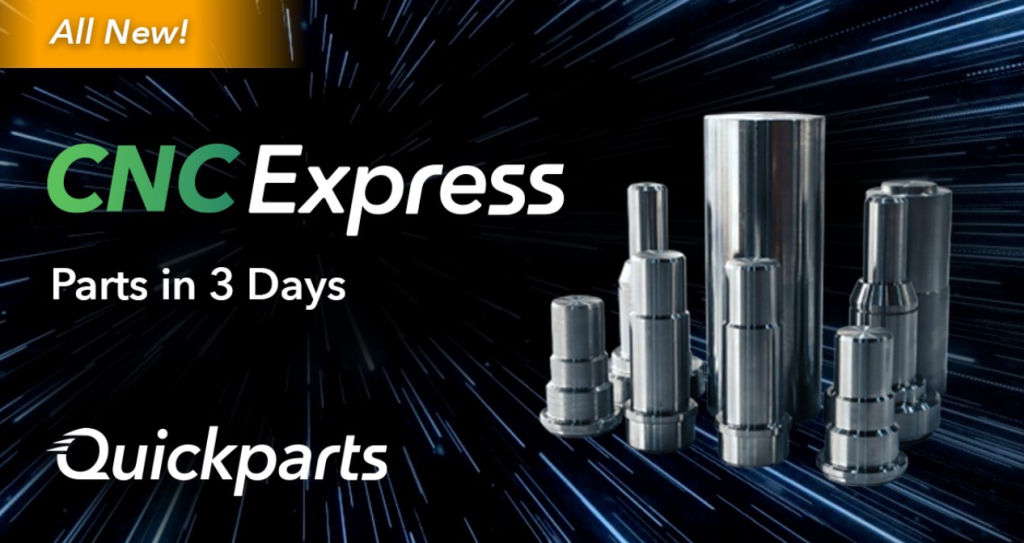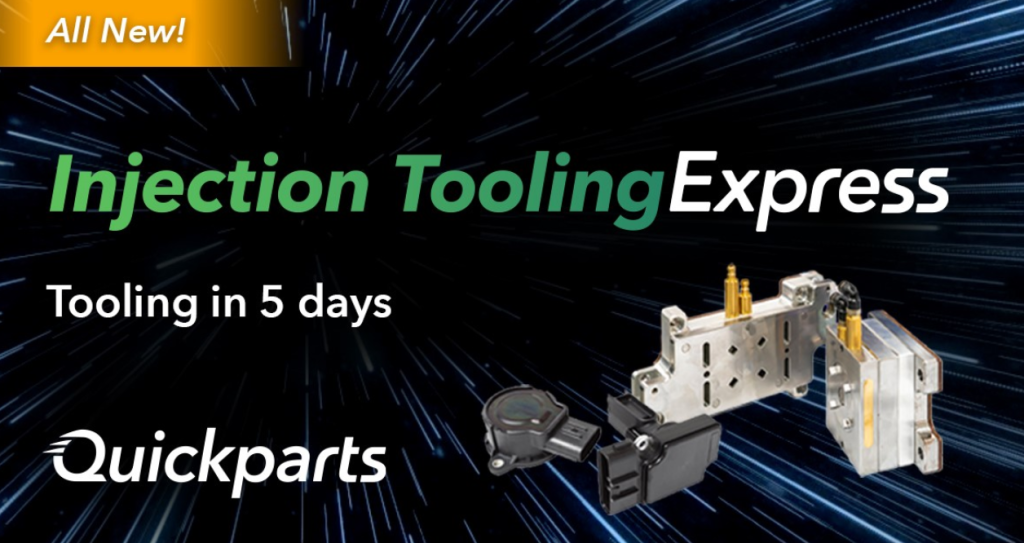Prototyping company Quickparts, has announced a new service offering as fast as same-day shipping.
This is made possible by the company’s use of novel manufacturing technologies such as the Lubricant Sublayer Photo-curing (LSPc) 3D printing technology from Nexa 3D high-speed resin 3D printers. Other technologies included are advanced CNC and Injection Molding technology. Ziad Abou, CEO of Quickparts said, “We are excited to bring our customers the speed and quality they need to meet today’s market demands.”
“Quickparts Express reflects our commitment to continuous innovation and customer service. We pride ourselves on technology that helps our customers with all their projects, large and small. We’ve been working closely with Nexa3D and have adopted their industrial and desktop 3D printers, using the ultrafast LSPc 3D printing process to help meet our customers’ needs for quicker turn times and uncompromised part quality,” added the CEO of Quickparts.

Quickparts Express and the company’s other industrial portfolio
Quickparts Express, which will first be available in the United States before expanding to Europe in early 2023, provides industry-leading turn times for 3D printed, CNC machined, and Injection Molded custom parts. Quickparts Express delivers custom parts and prototypes rapidly by combining 3D printing technology with traditional manufacturing processes. This service provides increased supply chain reliability due to regionalized manufacturing in both the United States and Europe—all while maintaining the high quality that Quickparts customers have come to expect.
“Nexa3D was founded on the premise of digitizing supply chains sustainably by making ultrafast polymer 3D printers accessible to professionals and businesses of all sizes,” said Nina Swienton, Chief Marketing Officer at Nexa3D. “We are thrilled to partner with Quickparts to further expand access to our industry-leading technology and at the same time deliver 3D printing services faster than ever before.”
Recently, Roboze, an industrial 3D printer manufacturer, added Quickparts to its Roboze 3D Parts Network. Quickparts believes that utilizing industrial 3D printing systems and innovative materials, will improve local production of customized parts worldwide. Quickparts announced the installation of the first Roboze solution, ARGO 500, in its Seattle headquarters, where it will be used to serve the aerospace and industrial companies across the United States.
Furthermore, Nexa3D, a manufacturer of high-speed resin 3D printers, debuted a suite of novel additive manufacturing products and partnerships at Formnext 2022. Nexa3D created an end-to-end 3D printing workflow designed to assist customers to enter serial production using DyeMansion post-processing, Siemens’ PLC software, and its own QLS 820 system. The company also introduced a new line of ceramic, flexible, and clear resins, along with installing machines at Xometry and Quickparts to give their customers access to their technologies.

3D printing services expanding
Previously, 3D LifePrints, a medical device manufacturer, revealed plans to expand its point-of-care medical 3D printing services to the United States with the launch of a facility in Texas. This is the company’s first global expansion, and it will be preceded by the opening of several new point-of-care hubs in other US states. Dr. Scott E. Parazynski, a physician and former NASA astronaut, reportedly joined the company’s US team.
Furthermore, RYUJINLAB, a Korean 3D printing technology company, revealed the launch of a low-cost metal 3D printing service in its home country. The service is targeted at both enthusiasts and manufacturing companies, and it is said to be the first of its kind in Korea. Although the company previously offered resin printing services using its proprietary Light Induced Planar Solidification (LIPS) technology, this service uses RYUJINLAB’s very own produced metal FFF 3D printer, which the company believes will compete with the likes of Markforged and Desktop Metal.
Injection molding and additive manufacturing
Previously, Fictiv, a San Francisco-based manufacturing firm, enhanced its injection molding Design for Manufacturability (DFM) system with 3D visualization. According to Fictiv, its Digital Manufacturing Ecosystem produces high-quality parts at an unprecedented rate. The improved software, according to the company, allows comprehensive automation of injection molding workflows, enabling clients to ramp up new product design while reducing manufacturing risks and delays. This enhanced system combines digital manufacturing issue tracking, part version control, and communication tools. 3D visualization also considerably improves the speed with which engineering teams can request, assess, and respond to injection molding DFM input, as well as approve parts for production.
Elsewhere, Structur3d, a Canadian soft materials developer for additive manufacturing, unveiled a desktop manufacturing platform for accelerating the research, prototyping, and production of rubber parts using a mixture of 3D printing and injection molding. By combining 3D printing and desktop injection techniques with factory-grade materials, the Inj3ctor platform aims to overcome the challenges that prevent 3D printed rubber parts from meeting manufacturing standards.
Follow this link for all the Formnext 2022 news.
To stay up to date with the latest 3D printing news, don’t forget to subscribe to the 3D Printing Industry newsletter or follow us on Twitter, or like our page on Facebook.
While you’re here, why not subscribe to our Youtube channel? Featuring discussion, debriefs, video shorts, and webinar replays.
Are you looking for a job in the additive manufacturing industry? Visit 3D Printing Jobs for a selection of roles in the industry.
Feature image shows Quickparts Express. Image via Quickparts.



